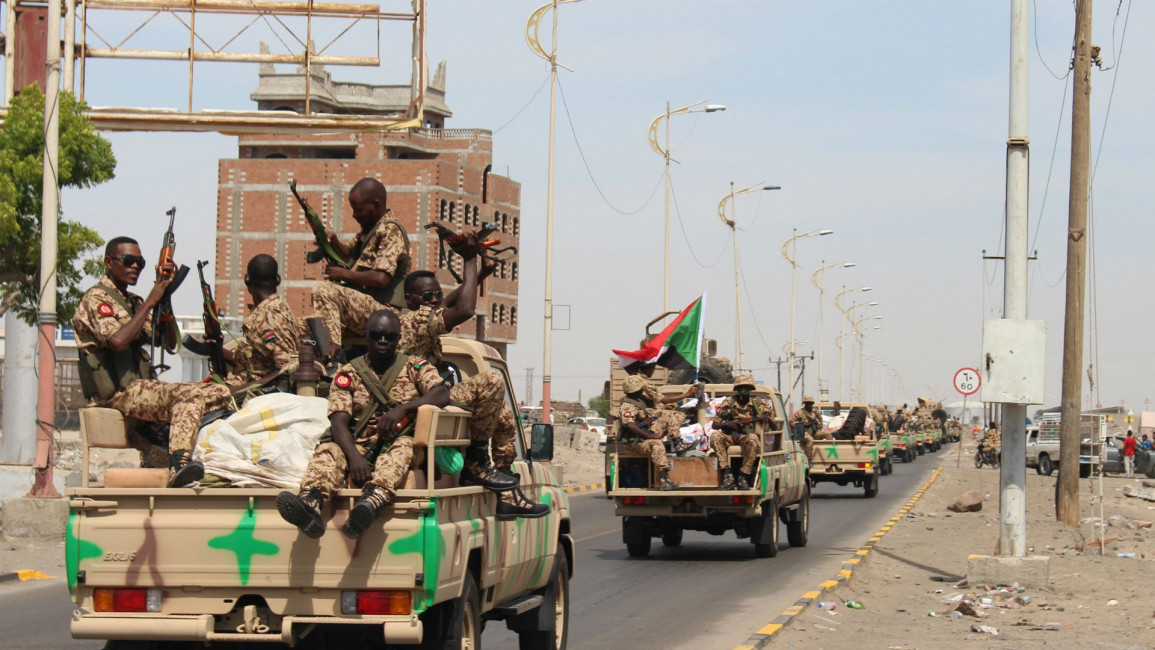Deadly Yemen ambush stirs calls to withdraw Sudan troops
Activists, citizens and politicians took to social media this week to demand Khartoum withdraw its troops from Yemen, where more than 10,000 Yemenis have died since the coalition intervened in 2015.
"People ask... 'What benefit have we got from this major decision?' - and they have no answer," Ghazi Salaheddin, a former minister of state for foreign affairs turned opposition leader, told AFP.
Before "we didn't have a single drop of bloodshed between them and Sudanese ... Now Sudanese are involved in combat with Yemenis.”
"Bring back our sons and brothers! Why are we fighting a war that is not ours?" activist Islam Saleh wrote on Facebook.
The outrage was triggered after dozens of Sudanese soldiers were reportedly killed by Houthi rebels in northern Yemen in a deadly ambush last week. The insurgents reported the attack on their Al-Masirah website.
The losses are reported to be one of the heaviest suffered by Sudan since deploying hundreds of soldiers in 2015 as part of an Arab coalition fighting on the side of the Yemeni government.
Khartoum has neither confirmed nor denied the report.
Bashir's decision to deploy troops came after a major foreign policy shift by Sudan that saw Khartoum break its decades-old ties with Iran and join the Saudi-led coalition.
Deploying troops means casualties and so a decision like this needs parliament's backing, said Salaheddin.
"Which is not the case here," he said, pointing to what he called a "lack of parliamentary support and... no clear political objectives" to the deployment of troops.
The alliance was launched to push back the Iran-allied Houthis, who seized control of much of Yemen including the capital Sanaa, and to restore the internationally recognised Yemeni government.
'Not Sudan's job'
Bashir, who came to power in an Islamist-backed coup in 1989, has said that joining the coalition was an "ideological" move.
"From the beginning, they said it was an ideological decision aimed at protecting the holy sites in Saudi Arabia," said Khaled al-Tijani, editor of Elaff newspaper, referring to Mecca and Medina.
"I don't think it's Sudan's job to protect the holy sites."
Sudanese also doubt the intentions of Saudi Arabia, Tijani said, as several high-ranking Saudi officials have visited neighbouring Cairo but not Khartoum.
Saudi Crown Prince Mohammed bin Salman visited Cairo last week and agreed on massive investments in Egypt, which is also a member of the coalition but has not deployed troops.
"Saudi Arabia helped Egypt with tens of billions of dollars but Sudan has received peanuts... People feel it's a type of discrimination," said Tijani.
"There is not enough compensation for Sudan from this strategic relationship as it is shedding blood in Yemen for this coalition," he said.
For Tijani, the losses in the Yemen ambush were proof of a foreign policy "failure" by Khartoum.
Khartoum has not disclosed how many troops it has deployed but insists it will remain in the coalition.
"I renew my commitment that our troops will continue with their mission within the Arab coalition until it achieves its noble goal," Bashir said last week.
Foreign Minister Ibrahim Ghandour reaffirmed the pledge at a meeting with envoys of Saudi Arabia, the United Arab Emirates and Egypt on Tuesday at which the diplomats offered condolences to families of Sudan's "martyrs" in Yemen.
Some experts say Sudan will ultimately benefit.
"Sudanese troops are guarding borders between Saudi Arabia and Yemen, which is why Saudi Arabia is in need of the Sudanese military," said columnist Ahmed Al-Noor.
"In the long term, Sudan will benefit."
Agencies contributed to this report.

![Bahrain [getty] Bahrain [getty]](/sites/default/files/styles/image_330x185/public/media/images/5F28B59A-942B-4B6A-A5A8-09D476D1E68D.jpg?h=d1cb525d&itok=NJNXWh5z)

